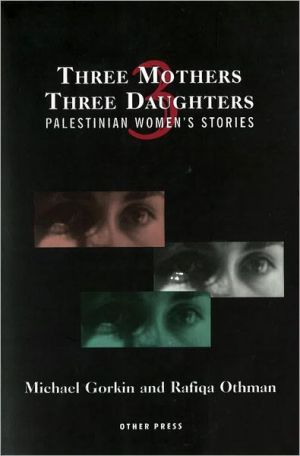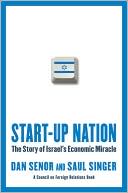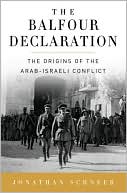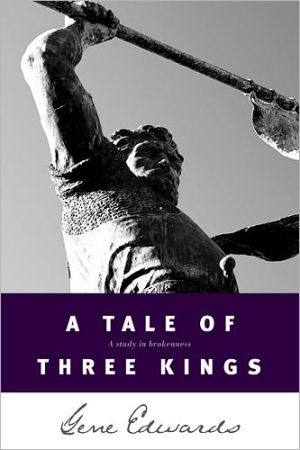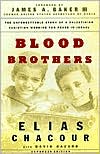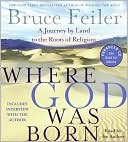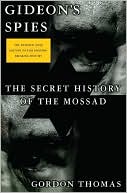Three Mothers, Three Daughters: Palestinian Women's Stories
Three Mothers, Three Daughters: Palestinian Women's Stories is the product of an unusual collaboration. Michael Gorkin is a Jewish-American psychologist and Rafiqa Othman is a Palestinian special education teacher. Both live and work in the Jerusalem area. Together they have produced this remarkably intimate portrait of Palestinian women. As the title suggests, three mother-daughter pairs are represented in this study. One pair comes from East Jerusalem, another from a refugee camp in the...
Search in google:
Gorkin, a Jewish-American psychologist, and Othman, a Palestinian special education teacher, have assembled interviews with three mother-daughter pairs. One pair comes from East Jerusalem, another from a refugee camp in the West Bank, and the third from an Arab village within Israel. In the telling of their personal stories, the women reveal a great deal about the turbulent history of the Palestinian-Israeli relationship. Their stories make it clear that changes that have occurred in the lives of Palestinian women, in the areas of education, work, and personal freedom, have not come easily. The authors live and work in the Jerusalem area. The volume includes a glossary; it lacks a subject index. Annotation c. Book News, Inc., Portland, OR Library Journal Gorkin (Days of Honey, Days of Onion, Univ. of California, 1993), a Jewish American psychologist living in Israel, and Othman, a Palestinian special education teacher, have teamed up to capture, through numerous interviews with women of different generations, candid and valuable accounts of the ways Palestinian Arab women see themselves and their roles relative to a changing yet still conservative society. The authors chose three mother- daughter couples from geographically diverse areas: a refugee camp on the West Bank, East Jerusalem, and an Israeli Arab village. Through these oral narratives, the reader come to see generational changes at play especially in the areas of education, choice of spouse and marriage, and employment. These women tell their stories in the first person in a spontaneous, vividly narrative that is not low on emotions and nostalgia. This book serves as a starting point for the understanding of an often-forgotten element in political and historical accounts of a tumultuous Middle East. Suitable for academic and women's studies collections.Ali Houissa, Cornell Univ., Ithaca, N.Y.
Map of IsraelAcknowledgmentsPrefaceIntroduction1Umm Mahmud and Marianne (East Jerusalem)13Umm Abdullah and Samira (Camp Aida)83Umm Khaled and Leila (Village of Abu Ghosh)157Epilogue221Chronology229Glossary233
\ Library JournalGorkin (Days of Honey, Days of Onion, Univ. of California, 1993), a Jewish American psychologist living in Israel, and Othman, a Palestinian special education teacher, have teamed up to capture, through numerous interviews with women of different generations, candid and valuable accounts of the ways Palestinian Arab women see themselves and their roles relative to a changing yet still conservative society. The authors chose three mother- daughter couples from geographically diverse areas: a refugee camp on the West Bank, East Jerusalem, and an Israeli Arab village. Through these oral narratives, the reader come to see generational changes at play especially in the areas of education, choice of spouse and marriage, and employment. These women tell their stories in the first person in a spontaneous, vividly narrative that is not low on emotions and nostalgia. This book serves as a starting point for the understanding of an often-forgotten element in political and historical accounts of a tumultuous Middle East. Suitable for academic and women's studies collections.Ali Houissa, Cornell Univ., Ithaca, N.Y.\ \ \ \ \ School Library JournalYA-Interviews with six women from three different Palestinian Moslem communities in the Middle East. Gorkin, a Jewish American, collaborated with Othman, a Palestinian special-education teacher, in securing consent and conducting interviews with the women, who live in East Jerusalem, the village of Abu Ghosh in Israel, and the refugee camp of Aida in the West Bank. Gorkin and Othman narrowed their selection to include only Moslem women. The first-person narratives include a variety of topics and present informative insights into the life of the older generation as well as that of the current generation. Major changes in attitudes toward education, marriage, and employment are obvious in these oral histories. Views on courtship, the family, politics, religion, and daily life can also be gleaned. In schools where there is a Middle Eastern Studies curriculum, this book will be a valuable asset. In high schools where there is a significant Arab community, it is a necessity.-Dottie Kraft, formerly at Fairfax County Public Schools, VA\ \
